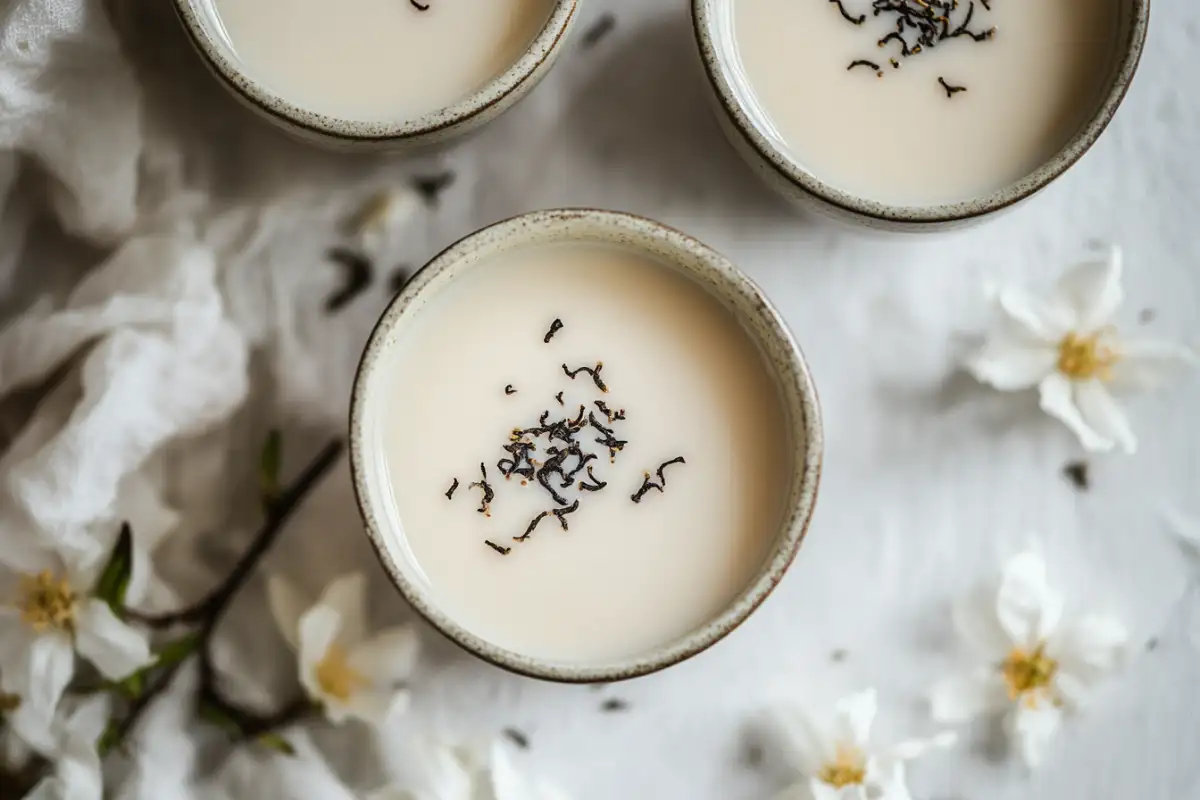Estimated reading time: 8 minutes
This comprehensive guide explores if jasmine milk tea supports overall health, comparing its nutrients, benefits, and risks.
Table of contents
Jasmine milk tea has become a popular beverage choice among tea lovers in the United States. Many enjoy its fragrant aroma and creamy taste. However, tea enthusiasts often wonder: Is jasmine milk tea healthy? This question arises because there is growing interest in healthier beverage options. Consequently, people want to understand how this drink fits into a balanced lifestyle. Altogether, this article explores the nutritional aspects, potential benefits, and possible downsides of this aromatic beverage. Eventually, you will learn how to enjoy it in moderation and decide if it aligns with your wellness goals.
What Is Jasmine Milk Tea?
Jasmine milk tea is a refreshing blend of green or sometimes oolong tea leaves infused with the scent of jasmine blossoms. The process involves layering fragrant jasmine flowers with tea leaves. Eventually, the leaves absorb the floral aroma. Afterward, these scented tea leaves become the base for jasmine tea. When combined with milk, it transforms into a creamy, mildly sweet beverage.
Traditionally, jasmine tea has roots in China. Over time, it gained popularity in various regions. Today, jasmine milk tea appears in cafes, bubble tea shops, and even homemade recipes. Basically, the drink often includes sweeteners like sugar or honey. Some recipes add chewy tapioca pearls for extra texture. Comparatively, variations also use non-dairy milks like almond, soy, or oat milk, catering to different dietary preferences.
Many people enjoy jasmine milk tea for its delicate floral notes. Indeed, the jasmine scent stands out, creating a sensory experience. Because of this, individuals appreciate the comfort and relaxation it offers. Nonetheless, before delving deeper into Is jasmine milk tea healthy?, it helps to understand its nutritional profile.
Understanding Its Nutritional Profile
Is jasmine milk tea healthy? To address this, consider the components: jasmine-infused tea leaves, milk, and sweeteners. Generally, jasmine tea leaves contain antioxidants like catechins and polyphenols. These compounds fight free radicals and may support overall wellness. Additionally, jasmine tea often contains some caffeine, providing a mild energy boost.
Milk contributes protein, calcium, and vitamin D. Dairy milk also adds fats, which vary based on the milk’s fat content. Meanwhile, plant-based milks (soy, almond, oat) bring their own nutrient profiles. Comparatively, sweeteners influence the healthfulness of jasmine milk tea. White sugar adds empty calories. Honey, maple syrup, or low-calorie sweeteners can be healthier substitutions. However, even natural sweeteners should be used sparingly.
Compared to plain green tea, jasmine milk tea tends to have more calories due to milk and sugars. Conversely, compared to coffee drinks loaded with syrups and whipped cream, jasmine milk tea can be a lighter alternative. Accordingly, its healthiness depends on ingredient quality, sweetness level, and portion sizes.
Potential Health Benefits
When exploring Is jasmine milk tea healthy?, it helps to look at the tea’s potential benefits. Generally, jasmine tea starts with green tea leaves, known for beneficial antioxidants like EGCG. These antioxidants, as some studies suggest, may support heart health and reduce oxidative stress. Another potential benefit is improved mood and relaxation. Jasmine’s aroma can have a calming effect, while green tea’s L-theanine may enhance focus and reduce anxiety.
Moreover, moderate caffeine content can boost alertness. Comparatively, jasmine milk tea may also provide certain vitamins and minerals from milk. Particularly, calcium and vitamin D support bone health. Additionally, if you choose plant-based milk, you might gain extra vitamins, minerals, or fiber.
Comparing With Other Herbal Teas
When asking Is jasmine milk tea healthy? and comparing it to other herbal teas, several factors come into play. For example, chamomile tea soothes digestion and induces relaxation, but lacks caffeine. Peppermint tea aids digestion and breath freshness, while green tea is rich in antioxidants. Jasmine tea shares many green tea benefits but stands out with its floral aroma.
Although jasmine milk tea differs from herbal infusions like chamomile or peppermint (which do not contain caffeine), its antioxidant profile generally exceeds many caffeine-free herbal teas. Jasmine milk tea, however, involves milk and sugar, which herbal tisanes usually do not. Therefore, you must consider the added ingredients when deciding if jasmine milk tea suits your health needs.
Is jasmine milk tea healthy? Choosing Quality Ingredients
Is jasmine milk tea healthy? The answer often depends on your ingredient choices. Chiefly, selecting high-quality jasmine tea leaves ensures a richer antioxidant profile and fewer additives. Organic leaves reduce exposure to pesticides. Likewise, choosing grass-fed dairy or fortified plant-based milks can improve nutritional value.
When it comes to sweetness, opt for minimal sugar. Another approach could be using a small amount of honey or a zero-calorie sweetener like stevia. Furthermore, read ingredient labels carefully. Some premade blends contain artificial flavors or excessive sweeteners. To keep it healthier, pick simpler blends with natural flavorings and minimal processing.
Is jasmine milk tea healthy? Tips and Healthy Recipes
If you want to control what goes into your cup, consider making jasmine milk tea at home. Initially, start with quality jasmine tea leaves. Steep them in hot water for a few minutes, then strain. Next, add a splash of warm milk. For fewer calories, pick low-fat or plant-based options. For sweetness, try a teaspoon of honey, a hint of stevia, or skip sweeteners altogether. You can add ice for a refreshing cold drink.
Experiment with ratios and discover what suits your taste. Eventually, you can reduce the sweetness over time. This approach helps retrain your palate to enjoy subtle flavors. By preparing your own jasmine milk tea, you have full control over ingredients. Thus, you ensure it aligns better with your health goals.
Possible Risks and Moderation Tips
Despite its appealing qualities, Is jasmine milk tea healthy? also involves understanding potential downsides. Primarily, sweeteners increase sugar content. High sugar intake contributes to weight gain, blood sugar spikes, and dental issues. Therefore, it is best to limit added sugars or select natural alternatives.
Some individuals experience caffeine sensitivity. Jasmine tea contains caffeine, although usually less than coffee. Nonetheless, if you are sensitive, limit consumption or choose decaffeinated versions. Lactose intolerance or dairy allergies might require plant-based milk options. Furthermore, store-bought versions can be calorie-dense and loaded with artificial ingredients.
Moderation remains key. Drinking one cup daily with minimal sugar and quality ingredients likely poses no issues for most people. Conversely, consuming multiple servings with full-fat dairy and lots of sugar every day could lead to health problems. Another wise approach is to pair jasmine milk tea with a balanced diet and plenty of water. This ensures a well-rounded intake.
Additional Considerations
Cultural appreciation plays a role in understanding jasmine milk tea’s place in a healthy lifestyle. Indeed, enjoying a cup of jasmine milk tea can be part of a mindful routine. Savor the aroma, embrace slow sips, and experience relaxation. While doing so, consider pairing it with a small handful of nuts or a piece of fruit for a more balanced snack.
Avoiding artificial flavors and colors can improve the beverage’s nutritional profile. Stick to natural ingredients whenever possible. If you frequent bubble tea shops, ask for reduced sweetness or use less syrup. In other words, small adjustments can have a big impact. Eventually, these choices shape a beverage that better fits your wellness goals.
It is also worth noting that the overall environment in which you enjoy jasmine milk tea can influence your perception of its healthfulness. For example, savoring a cup in a calm setting with a friend or while reading a good book may enhance relaxation and reduce stress. This pleasant ambiance, combined with thoughtful ingredient choices, further supports the idea that enjoying jasmine milk tea, in moderation, can contribute positively to your well-being.
Frequently Asked Questions
This common query often parallels the central question: Is jasmine milk tea healthy? The answer depends on how you prepare it. Jasmine milk tea can offer antioxidants and relaxation benefits due to its jasmine-infused green tea base. However, it also contains sugar and calories. To make it healthier, choose high-quality jasmine tea leaves, limit sweeteners, and use low-fat or plant-based milks. In moderation, jasmine milk tea can fit into a balanced diet.
Jasmine tea alone, without milk or sugar, is often considered beneficial. It contains antioxidants, polyphenols, and catechins that support overall wellness. These compounds help protect cells from oxidative stress. Jasmine tea may also have mild calming effects. Moreover, it often has less caffeine than coffee, making it a gentler energy booster. Nonetheless, benefits depend on quality and brewing methods.
Calorie counts vary widely based on ingredients. Plain jasmine tea contains almost no calories. Adding milk and sweeteners increases the count. A typical 16-ounce jasmine milk tea might range from 100 to 300 calories, depending on the milk type and sweetener amount. Choosing skim milk or unsweetened plant-based milk can reduce calories. To get an accurate count, measure ingredients at home or check nutrition information at your local cafe.
Milk tea’s healthiness depends largely on its components. Plain tea, especially green or black varieties, provides antioxidants. Adding milk offers protein and nutrients, but also adds calories. Sweeteners contribute additional calories and possibly spike blood sugar levels. To keep milk tea healthier, choose low-fat or plant-based milks and use minimal sugar. Moderation remains essential. A single cup as an occasional treat can be part of a healthy lifestyle. However, frequent, high-calorie, sweetened milk teas may undermine health goals.
Conclusion
When considering Is jasmine milk tea healthy?, the answer is not a simple yes or no. Undoubtedly, jasmine milk tea can offer certain benefits due to the jasmine-infused tea leaves, their antioxidants, and the calming aroma. By choosing quality ingredients, controlling sweetness, and balancing your overall diet, jasmine milk tea can be a pleasant and refreshing part of your routine.
Nevertheless, moderation is essential. Overindulgence, especially when using full-fat dairy and lots of sugar, can outweigh potential benefits. Conversely, a mindful approach ensures that jasmine milk tea remains an enjoyable treat rather than a nutritional liability. Ultimately, when consumed responsibly and in line with personal health goals, jasmine milk tea can be a delightful beverage that fits comfortably into a balanced lifestyle.

